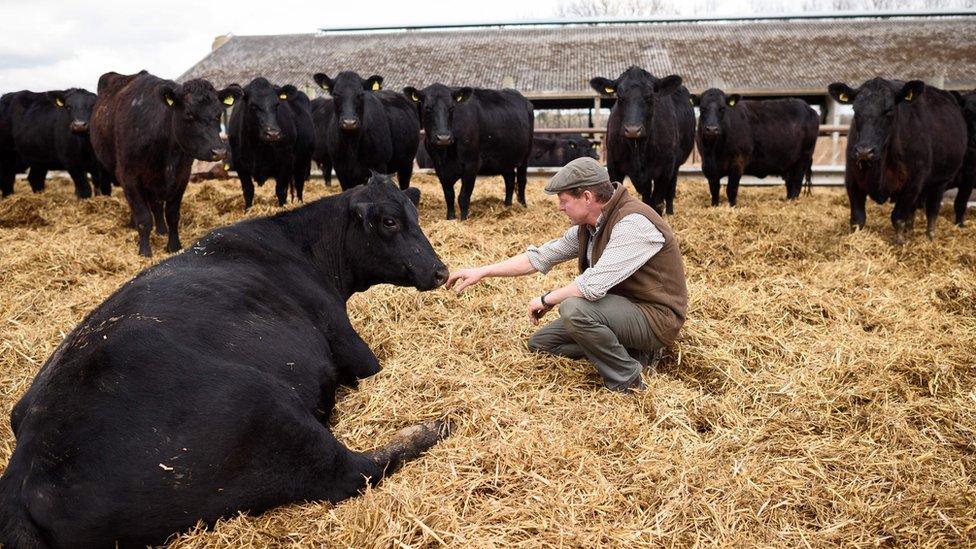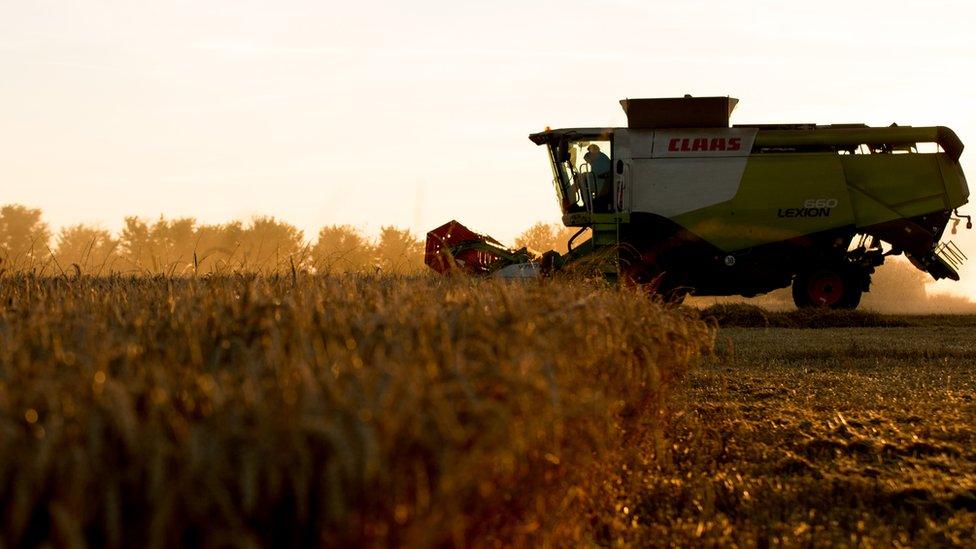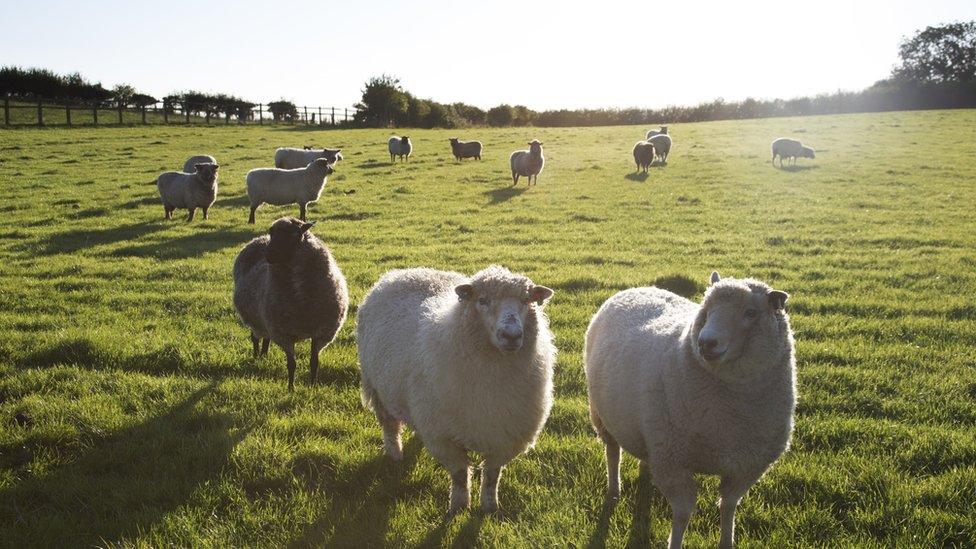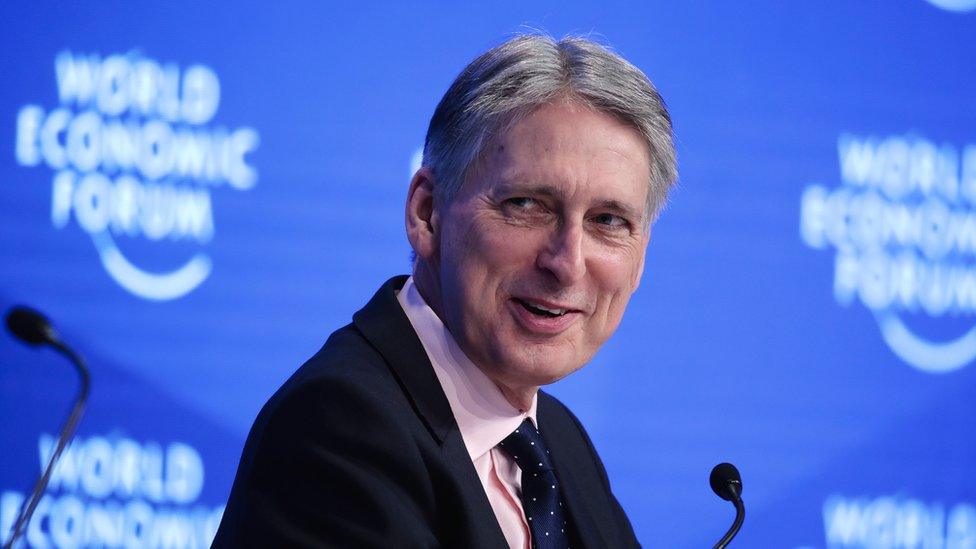Farmers fear Brexit lands them in agricultural business
- Published

Most farmers were enthusiastic Remainers
"We're Out!"
So declared David Dimbleby during those unforgettable early hours of 24 June last year, as the epic scale of what we were witnessing started to sink in.
From my outside broadcast position at the Birmingham count, I spelled it out in my best stentorian tones: "The English heartlands have voted overwhelmingly to Leave the European Union".
But there is a danger in generalisations like this. They can imply a uniformity of opinion which may be an over-simplification. Take the farming community for example. They have more at stake than most in all this. So how do they view the prospect of Brexit just over six months on from that historic vote?
In the West Midlands alone, they contribute nearly one billion pounds to the economy per year and account for a total area equivalent to 34 Birminghams.
EU subsidies are worth nearly £2.5 billion per year to British agriculture.
Almost half of our farmers say they depend on them for the lion's share of their incomes.

EU subsidies are worth nearly £2.5 billion per year to British agriculture.
So the argument throughout the Referendum campaign revolved around the vagaries of post-Brexit British governments and whether or not they could be relied upon to maintain a similar level of support.
The Chancellor Philip Hammond promised after the Referendum to make good any shortfalls until 2020.
Then what?
One Warwickshire farmer told me he was worried Mr Hammond's successors could turn out to be more flaky in their support for farmers than is the European Union's Common Agricultural Policy, backed up by the threat of French farmers "burning the place down" if anyone dared to tinker with it.
"I love those French farmers," he told me.
But would any conceivable British government really take an axe to farm subsidies?
They were first introduced here in Britain 60 years ago.
Successive governments kept them going, long before the UK signed-up to the then Common Market, to ensure the supply of affordable food.
Leave reckon Norwegian and Swiss farmers enjoy more generous deals with their national governments than their neighbouring counterparts within EU's Common Agricultural Policy.
Hard Brexit
In a week when the Supreme Court ruled that MPs must have a vote before the Government can trigger Article 50, we wondered how those farmers are coming to terms with the hard realities of a hard Brexit.

Lamb producers need access to major EU markets
Malcolm Roberts farms 500 acres near Oswestry in Shropshire, with 250 beef cattle, 1000 breeding ewes and 90 acres of arable. "Heart and head are two different things," he told us.
In common with most lamb producers, he exports to France and Spain so it is essential for him that he continues to have access to major EU markets.
Without them, he warns, he would go out of business.
Ray Bower also has a 500-acre mixed farm. His is just outside Penkridge nearStafford.
But he is among the vocal minority of farmers who feel they have little or nothing to fear from Brexit even though his profits add up to less than half of what he receives in EU subsidies.

Philip Hammond promised after the Referendum to make good any shortfalls until 2020.
He believes an independent Britain will bring an end to burdensome, costly and unnecessary red tape and enable British governments to legislate in the interests of British farmers.
He also takes comfort from the idea that British meat producers we will still have access to EU markets so long as the Europeans want to sell us their cheese and Champagne.
Farmers Roberts and Bower will both be talking to our Political Reporter Joanne Gallacher in this weekend's Sunday Politics.
And I will be joined in the studio by Nigel Huddleston, the Conservative MP for Mid Worcestershire, and Emma Reynolds, Labour MP for Wolverhampton North East.
Remember, if it's Sunday 29 January 2017, it's the Sunday Politics, at 11.00 on BBC One Midlands.